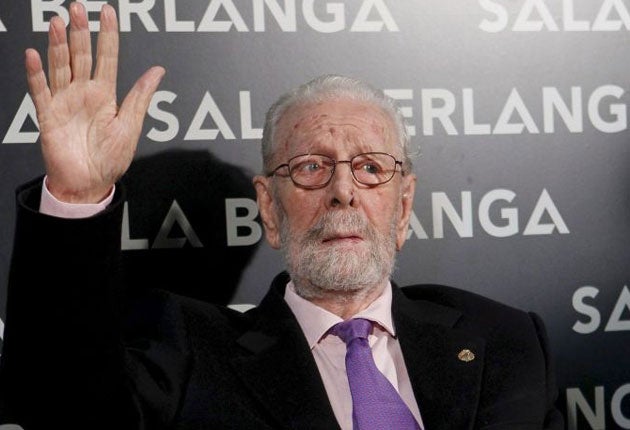Luis García Berlanga: Film-maker whose subversive comedies infuriated the Franco dictatorship

Your support helps us to tell the story
From reproductive rights to climate change to Big Tech, The Independent is on the ground when the story is developing. Whether it's investigating the financials of Elon Musk's pro-Trump PAC or producing our latest documentary, 'The A Word', which shines a light on the American women fighting for reproductive rights, we know how important it is to parse out the facts from the messaging.
At such a critical moment in US history, we need reporters on the ground. Your donation allows us to keep sending journalists to speak to both sides of the story.
The Independent is trusted by Americans across the entire political spectrum. And unlike many other quality news outlets, we choose not to lock Americans out of our reporting and analysis with paywalls. We believe quality journalism should be available to everyone, paid for by those who can afford it.
Your support makes all the difference.Luis García Berlanga was a consistently disruptive presence in Spanish cinema of the second half of the 20th century. As a member of the first set of graduates from the Madrid Film School in 1950 his corrosively humorous films infuriated the military dictatorship of Francisco Franco.
Best known outside Spain for his remarkable solo debut ¡Bienvenido, Mister Marshall! (Welcome Mister Marshall!, 1952) – a film widely recognised as having changed the face of Spanish cinema – Berlanga would later go on to make two of the greatest films in the nation's canon, Plácido (1961) and El verdugo (The Executioner, 1963). The former, a savage inversion of the feel-good Christmas film genre, was nominated for an Oscar for best foreign-language film; the latter, a caustically comic indictment of the death penalty, is arguably his most sustained achievement.
Together with his film school classmate, Juan Antonio Bardem, with whom he collaborated on Esa pareja feliz (That Happy Couple, 1951), Berlanga pioneered a subversive cinema that undermined the cultural strictures of Francoism while simultaneously working within it. Unlike Bardem (who died in 2002) and many others of his generation Berlanga never joined the Spanish Communist Party. He often confessed his inability to submit to any kind of party discipline and indeed Franco is reported as having remarked of the film-maker: "Berlanga is not a Communist. He is something much worse: he is a bad Spaniard".
From 1951 until he retired in 1999 Berlanga, who directed 17 features,repeatedly explored the sordid underbelly of Spanish civil society andexposed its failings with savage,lampooning wit. From targets such as the Catholic model of the nuclear family to the Spanish tourist boom of the early 1960s, his parodic comedy was based on corporeal function and dysfunction, on eating, drinking and defecation. Berlanga knew better than anyone how to read and exploit for the purposes of film the richly bodily nature of Spain's comic cultural traditions that stretch back to the Middle-Ages. In this, while often linked stylistically to Italian neorealism, Berlanga shared a closer affinity, in their common interest in the grotesque, with his friend Federico Fellini.
Born into a wealthy land-owning family in Valencia in 1921 Berlanga enjoyed an untroubled upbringing interrupted by the onset of the Spanish Civil War in July 1936. Conscripted by the Second Republic into a medical unit in the latter stages of the conflict the future cineaste would later volunteer – in one of the many paradoxes of Berlanga's life – to serve in the Divisió* Azul, the unit of the Spanish armed forces who fought for Germany against the Soviet Union in the Second World War as part of an agreement between Hitler and Franco. This was done in an effort to gain favour with the regime and save his father, an elected Republican official, who had been sentenced to death by the new Rregime.
Eventually his father's sentence was commuted, although he remained in prison until 1952. Although he never directly saw action, Berlanga would draw upon these experiences in later life and the dark comedy that pervades his cinema is marked by these ironic autobiographical twists. Berlanga was not only the funniest but also the bleakest Spanish filmmaker.
Having studied and written extensively about Berlanga's work, I was privileged to hear him speak publicly in Madrid many times. He was an irrepressible raconteur. On one of those occasions, in celebration of his 80th birthday, Berlanga, in sparkling form, observed that that very afternoon – 12 June, 2001 – George W Bush had commenced his maiden tour of Europe with a visit to Spain. The director wryly observed that in an echo of the final sequences of ¡Bienvenido, Mister Marshall! – a film that parodies US-Spanish relations – Bush's cavalcade had sped past Berlanga's home in a Madrid suburb on its way to King Juan Carlos's residence in the nearby Zarzuela Palace.
Berlanga's comedy and formal dexterity had its own politics beyond party affiliation. His deceptively chaotic use of the crowd, the chorus of repertory actors who invade the frame at every opportunity, reinforced by his particular use of the sequence shot, produced an effect both cacophonic and democratic. The loyalty of his actors attests to his directorial skills. Amid the many accolades that have followed Berlanga's death in recent days, Spain's most internationally celebrated director, Pedro Almodóvar, who acknowledges Berlanga's influence, was perhaps the most salient when he drew attention to the extraordinarily talented team of actors who worked with him for 50 years and whose choral function in Berlanga's films gel perfectly with his signature long takes.
Luis García Berlanga, filmmaker: born Valencia 12 June 1921; married 1954 María Jesús Manrique (three sons, and one son deceased); died Madrid 13 November 2010.
Join our commenting forum
Join thought-provoking conversations, follow other Independent readers and see their replies
Comments